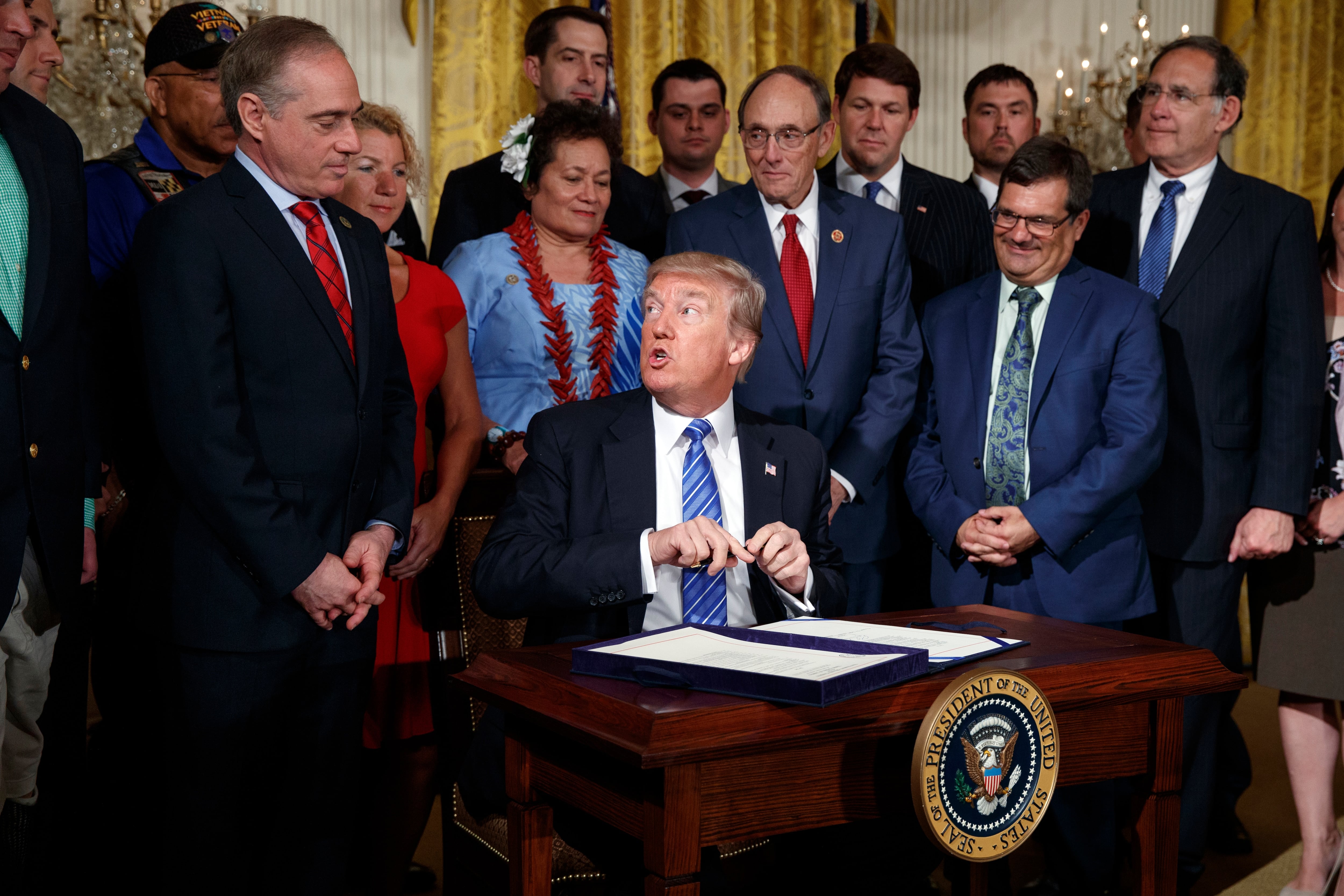WASHINGTON — President Trump signed into law Friday sweeping new employment and whistleblower rules for the Department of Veterans Affairs, a measure supporters touted as a dramatic cultural change for the bureaucracy but one whose impact will likely take months or years to be seen.
"This is one of the largest reforms to the VA in its history," Trump touted in a White House ceremony. "It is a reform that I campaigned on, and now I am thrilled to be able to sign that promise into law.
"VA accountability is essential to making sure our veterans are treated with the respect they have so richly earned through their blood, sweat and tears."
Earlier in the week, VA Secretary David Shulkin praised the accountability legislation as a major reform for his department, one that will help repair the image of its 350,000-plus workforce by getting rid of criminal or negligent actors.
"I need the ability to remove employees who are not longer working to help veterans," he said during a press event. "And I think this will dramatically improve morale and recruitment."
"When people are allowed to remain in jobs when they aren't respecting the values of the organization, that's harmful, not helpful."
VA officials have said it takes about 51 days to dismiss most employees under current rules. With the changes in the new law, that could be cut by more than half. The timeline for appeals to the Merit Systems Protection Board would also be significantly reduced.
For senior executives, the VA secretary would have the authority to reprimand or fire them through a 21-day internal department grievance process, replacing a previous congressional attempt at faster discipline for those employees that was ruled unconstitutional earlier this year.
The measure also allows VA officials to recoup certain bonuses from former employees found guilty of wrongdoing, and lessens the evidence needed to start disciplinary action against VA workers.
Supporters note that not all of the provisions of the legislation are punitive. The measure includes new protections for whistleblowers who help highlight flaws in the VA workforce and gives the VA secretary authority to directly appoint hospital directors, an ability they have argued will make them more competitive in recruiting top talent.
But the focus of the bill for years — including that of Trump on the campaign trail last year — has been finding ways to root out problem workers. Conservatives painted President Barack Obama’s VA as a corrupt organization where leadership mistakes and widespread apathy were frequently ignored rather than corrected.
"The big difference with this legislation now is that you have a White House and VA that supports the idea," said Dan Caldwell, policy director for Concerned Veterans for America, one of the leading groups behind the measure. "The last administration was not serious about (accountability) or getting the power it got."
Shulkin’s predecessor, former VA Secretary Bob McDonald, frequently pushed back against that narrative, repeatedly saying that the embattled department "cannot fire its way to success."
And Shulkin has downplayed how much immediate effect the legislation will have. He described the number of VA employees who need to be fired as "very small" and promised it would not lead to "a mass firing" in his department.
"I don’t think this is going to be something that is abused," he said at an event just before the bill signing. "I take it seriously that everyone deserves due process and we’re going to make sure due process exists. But when we find evidence … we’ve seen a lot of cases recently in the press that have been so frustrating."
"After today, I think we’re going to be able to change that course in VA and it will be a positive step forward."
Caldwell echoed that sentiment.
"It takes a long time to change a culture," he said. "But the immediate effect is that this bill will send a message that the old way of doing things at VA is over."
Unlike previous attempts at accountability legislation, this bill received broad support from Democrats in Congress despite some reservations about too harsh restrictions for employee appeals. No Democrats were among the lawmakers in attendance at the White House ceremony.
In a statement, House Veterans’ Affairs Committee ranking member Rep. Tim Walz, D-Minn., called the path to new accountability legislation "challenging" but added that "thanks to the leadership of members on both sides of the aisle and in both chambers we were able to come up with a strong piece of legislation that will improve the veteran experience at VA."
Trump promised there are more reforms to come. The department has already established a new office to oversee implementation of the accountability laws and look for similar future reforms. Shulkin said he expects to start issuing internal rules related to the new law early next week.
"We will not rest until the job is 100 percent complete for our veterans," the president said.
Reporter Karen Jowers contributed to this story.
Leo Shane III covers Congress, Veterans Affairs and the White House for Military Times. He can be reached at lshane@militarytimes.com.
Leo covers Congress, Veterans Affairs and the White House for Military Times. He has covered Washington, D.C. since 2004, focusing on military personnel and veterans policies. His work has earned numerous honors, including a 2009 Polk award, a 2010 National Headliner Award, the IAVA Leadership in Journalism award and the VFW News Media award.





